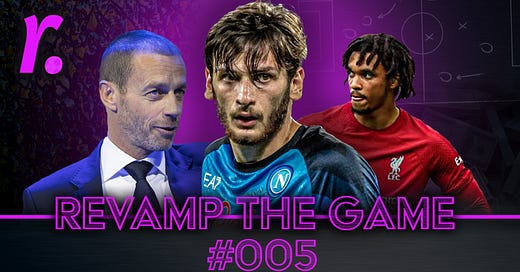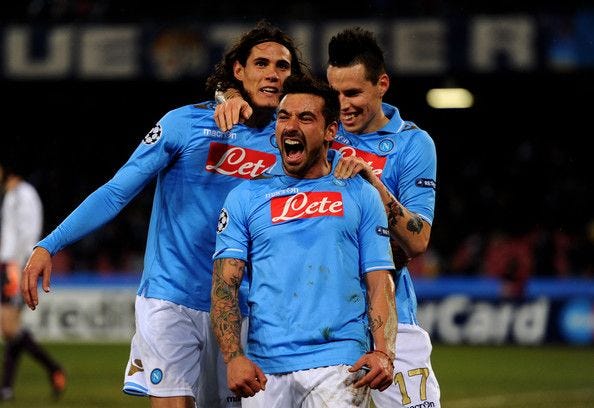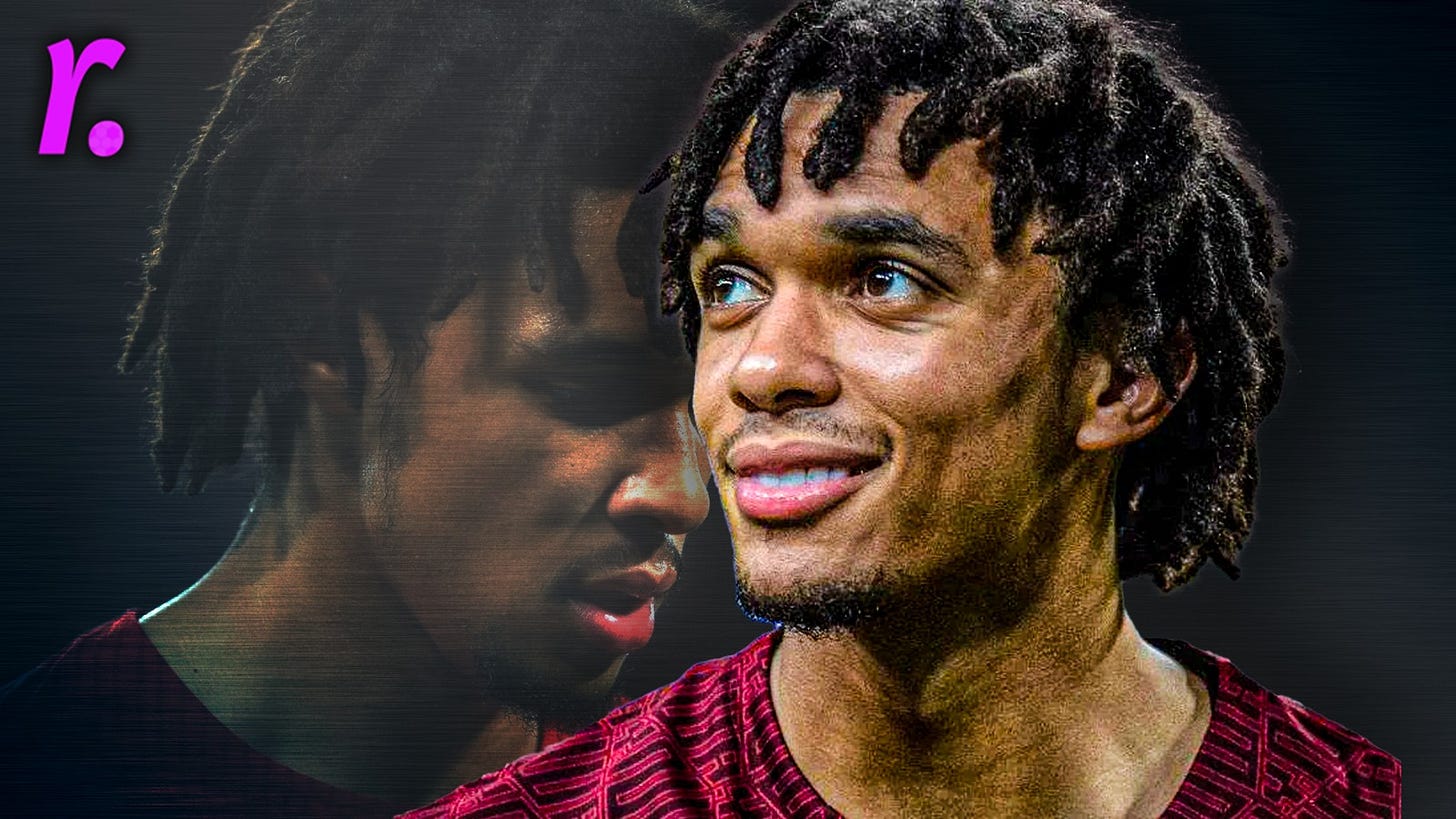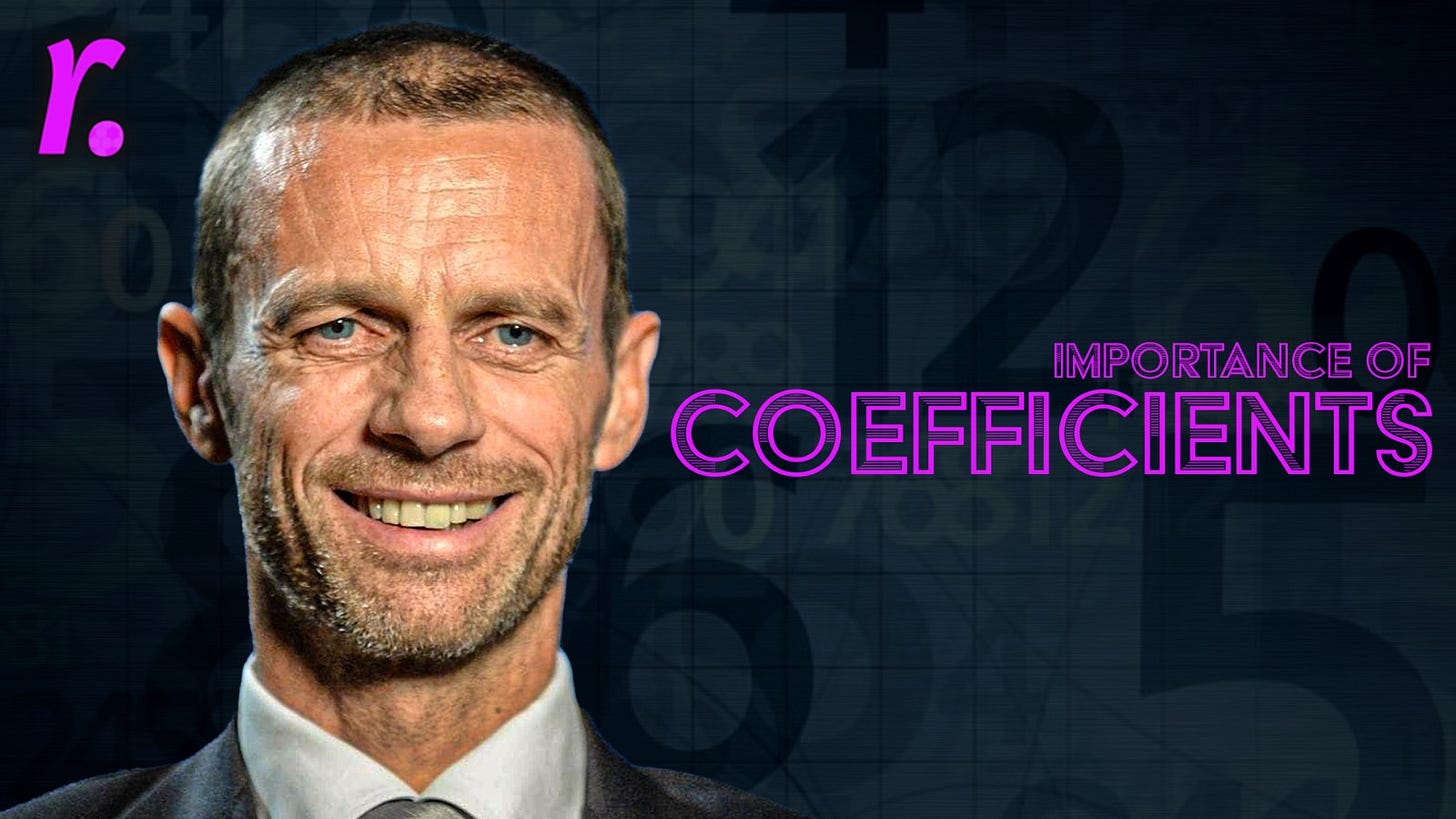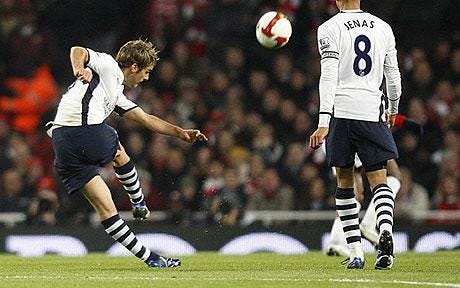Newsletter #005: 'Football Is About Joy... I Favour Every Idea That Makes The Game Beautiful. Every Good Idea Has To Last.’
'Kvaradona' eyes up the vacant throne in Naples, Trent and Liverpool amongst a torrent of criticism, understanding the UEFA Coefficient System & the importance of mental health & football.
#005
‘It’s three of the best, he’s made them pay & that completes a wonderful hat-trick.’ - Martin Tyler (EA Sports Fifa)
Yes guys, as you can tell, we have just the three special pieces to bless you with today but I assure you all that they are worth it in today’s edition of Revamp The Game. Headlining is Kaustubh with a look at the much-hyped Kvicha Kvaratskhelia and a Napoli side reborn and looking to bring back the clubs long awaited glory days. Evan focuses upon Liverpool’s defensive deficiencies that lie deeper than just a Trent Alexander-Arnold agenda. Finally, making his debut, David talks us through the UEFA Coefficient system and how it actually works.
With this week recognising International Mental Health Day, Ömer concludes with a reminder that yes, football is just a game and that the mental well-being of players and coaches must be acknowledged instead of desensitised.
The many Gems In A Neapolitan Worn Crown
Kaustubh Pandey
‘Down South, We Do It Different…’
For a long while, Serie A had been plagued with financial constraints that held pretty much every club back. While Juventus’ early commercialisation helped them to be the only club that avoided this economic hindrance, the league’s overall quality and watchability fell during the Bianconeri’s dominance. Milan and Inter fell out of prominence, with Roma only briefly punching above their weight. It was during these times though that Napoli’s consistency came to the fore.
A lot of it was down to how they operated despite not being awash with financial resources - with all due respect to Maurizio Sarri’s excellent coaching of individual players within his system. However, if the Partenopei hadn’t recruited smartly, Sarri’s revolution in Calcio would’ve never taken place. Whilst a host of other clubs went about spending money which allowed little return, Aurelio de Laurentiis looked at younger players destined for a higher resale value and it was something new in the Italian top-flight, especially post-Calciopoli.
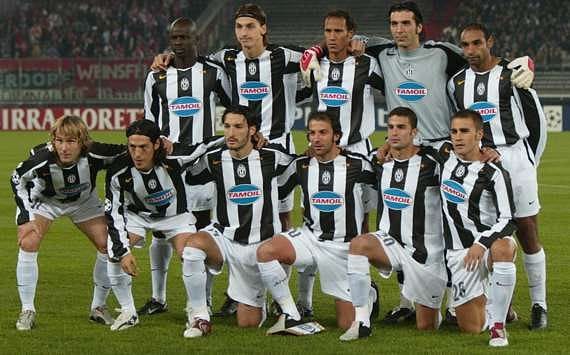
Khvicha Kvratskhelia is a very recent example, as the Georgian begins to tear the Serie A and Champions League apart. Yet, bringing lesser-known talents to the mainstream fold isn’t new for Napoli, who have now established this policy as part of their brand. The loss of the previous core crop of talent in Naples, a majority of which left in the previous summer transfer window, was expected to leave Luciano Spalletti’s side in a lurch. But this is Napoli.
‘Out With The Old, In With The New…’
Lorenzo Insigne, Dries Mertens, Kalidou Koulibaly and Fabian Ruiz had departed in the summer and all four are prominent examples of what Napoli stand for today. Mertens, now at Galatasaray, had arrived from PSV for €9.5 million and apart from being the club’s highest goalscorer in history, the Belgian filled into more than two positions across different managers and became an emblem of the club. Following the controversial departure of Gonzalo Higuain to Juventus, Mertens donned the role of a false nine under Sarri and proved his mettle in a completely different way.
Despite leaving on a free transfer, his contributions for the Partenopei will never be doubted. The same can be said for both Koulibaly and Fabian, with the Senegalese joining from Genk for only €7 million and the Spaniard joining from Real Betis for €30 million. Even though the Spaniard’s transfer fee was high - as compared to the other signings, the current Paris Saint-Germain man became one of the best midfielders in Serie A and came up with vital performances in big games. This is perhaps best typified by his screamer against Lazio last season in a win that took Napoli to the top of the league.
Even though Fabian’s performances get the credit they deserve, his versatility doesn’t. During Carlo Ancelotti’s reign, the Partenopei had no pure defensive midfielder until Diego Demme’s signing from RB Leipzig. Ancelotti, who is a fan of players that offer versatility, used Fabian in a host of positions including defensive midfield, right wing, left wing and even the No.10. Even last season, the former Real Betis man was often used as Napoli’s deepest midfielder, providing a versatility that very few players are blessed with.

‘Naples Need For A Saviour’
While Insigne was not versatile by any means, he was the closest Napoli got to the God like figure of Diego Maradona, who is widely acknowledged as not just Napoli’s greatest ever player, but footballs greatest ever player. The Italian had joined the club as a 15-year-old for €1,500 and went on to become a decade defining talisman in the club’s history. Towards the end of his time at the Stadio Diego Armando Maradona, Insigne’s non-penalty contributions began to dry up and he came under criticism for it. Perhaps the resultant low burden of expectation came in handy for Insigne’s replacement, Kvaratskhelia.
In fact, in the 2019/20 season and the 2021/22 season combined, Insigne scored only a total of five non-penalty goals. Kvaratskhelia has already matched that figure nine games into his first season at the club, whilst also striking fear into every defence that has crossed his path. If anything, the newfound young spine at Napoli has helped too, with Giacomo Raspadori finally proving his worth at a high level and pretty much acting as a replacement for Mertens.
(Above: Kvaratskhelia in action. Will he become one of Europe’s finest ever players.)
The Italian is regarded as one of the best up and coming talents in Serie A following his previous exploits under Roberto de Zerbi and Alessia Dionisi at Sassuolo. As he is currently on loan at Napoli, Raspadori could cost about €30 million should Napoli look to purchase him next summer. This also holds true for Kim Min-Jae, who has been regarded the best defender in the division so far. It seemed nigh-on impossible for Napoli to replace Koulibaly after his transfer to Chelsea, but once again, via clever scouting, Napoli spent only €20 million to find a more than capable replacement. Kim’s complete abilities on the ball make him a rare quantity and he is already attracting interest from a host of big clubs around Europe.
It doesn’t end there though, as Andre-Frank Zambo Anguissa is also a very perfect example of how the Partenopei do business. During Fulham’s turbulent time in the 2019/20 Premier League campaign, the midfielder had very impressive underlying statistics despite a lack of goal contributions. As English clubs looked for high-profile talents, the Azzurri snapped him up on an initial loan deal before signing him permanently for €17 million - a fee which seems nothing for a multi-faceted midfielder.
His performances have gone up a level this season - just like those of Stanislav Lobotka, who was initially believed to be a signing that was not repaying his yield due to injuries. However, rejuvenated and healthy, Lobotka is now performing as the club’s deepest midfielder, the €24 million capture from Celta Vigo is arguably ‘on form’ the best midfielder in Serie A. All of a sudden, Fabian’s departure to PSG is not felt at all in Naples.
‘A Legacy Of Smart Business…’
The current Napoli side is filled to the brim with clever signings such as the above examples. Yet, this policy seems to be ingrained in the nature of the club, with the likes of Cavani, Hamsik and Lavezzi developing into global stars at the Naples based club.
This is a football club which has been built on the back of Maradona’s miracles and everything magical that has occurred since in Naples, whether fairly or unfairly, has been compared to those days - much like how Kvara is already being labelled ‘Kvaradona’. But the club has a new identity now and one doesn’t have to dig too deep to find it. Is this the new golden age of Napoli, well we’ll just have to wait and see.
Kaustubh Pandey
Trent’s Rock and Liverpool’s Hard Place: A Neglected and Festering Issue
Evan Gregory
‘Torrential & Turbulent…’
By all definitions, Trent Alexander-Arnold is having a poor season. Liverpool’s playmaking talisman is the source of constant debate, discussion and scrutiny. He recently found himself left out of Gareth Southgate’s England plans with only months left before a mid-season World Cup in Qatar, and faces an uphill battle to reinstate himself as the undisputed best right back in world football. Trent is his own harshest critic–he certainly doesn’t need to be told that his recent defensive showings haven’t been good enough, but he’s receiving little to no help on that front, both in terms of his teammate’s contributions and Liverpool’s tactical setup.
Much was made of Liverpool’s formational switch in last Tuesday’s UCL group stage clash with Rangers. The struggling Reds set aside their famous 4-3-3 shape in favour of a formation that looked more like a 4-4-2 or a 4-2-3-1, depending upon who you ask. The switch seemed to pay dividends–Liverpool looked like Liverpool again, controlling all aspects of the game for the entirety of the 90 minutes. It seemed like a given that Jurgen Klopp would stick with this shape going into a crucial Sunday clash with Arsenal.

The gamble didn’t quite pay off. Liverpool were instantly opened up, with Gabriel Martinelli slotting the ball past Alisson from close range with only 59 seconds on the clock. Almost instantly, both the broadcast camera and the wider footballing community zeroed in on Trent, seemingly because Martinelli had made his penetrating run in behind Liverpool’s fullback. However, if you examine the goal outside the lens of Twitter, it is clear that Trent is left high and dry by his teammates. In the still image below, you could easily make a case that he's responsible for covering 4 different players here. Virgil Van Dijk tracking Saka's run also plays both of the overlapping left-sided runners well onside. In this situation, Trent is damned if he does, and damned if he doesn’t. Any simple pass from Odegaard gives Arsenal a great look at goal.
‘The Cracks…Have Cracked…’
Unfortunately, this is hardly a new phenomenon. Despite being nearly perfect last season, there were some discernible cracks and recurring themes taking shape in Liverpool’s defensive system. A combination of injuries and poor systematic fits led there to be a noticeable lack of pace and power on Liverpool’s right hand side, specifically in defensive transition. Liverpool conceded what felt like the same goal multiple times last season, and have done so at an alarmingly increased rate going into the current campaign. In their classic 4-3-3, Liverpool right sided central midfielder often pushes high when Liverpool have the ball, often swapping positions with the attackers and making runs in behind the opposing defensive line. More often than not, this player was Jordan Henderson.
There was a time when Liverpool’s captain could be described as a robust and powerful midfield runner, but the 32 year old’s legs seem to have given out, and he no longer gets up and down the right side of midfield like he did throughout the beginning of Klopp’s reign. In defensive transition, this has often seen Trent left vulnerable and exposed on the counter. There’s no shame in being an inferior defender to Andrew Robertson, so it makes sense that opposing teams would target the right hand side of Liverpool’s defence. It’s also worth noting that this is the side Virgil Van Dijk does NOT play on, which one could also argue might be the biggest factor in this decision. Long story short, Trent’s side is often targeted, and Liverpool’s post-Wijnaldum midfield setup combined with their trademark high line and press often leaves him isolated and left to deal with nightmarish defensive scenarios.
In the above image of last season’s thrilling 3-3 draw with Brentford, Liverpool conceded at the back post TWICE as a result of a comical overload of Trent’s defensive side. It doesn’t matter whether you have a ‘prime Cafu’ in these situations–almost every professional footballer on earth is going to lose a 3 or 4 vs 1 scenario against other professional footballers.
These examples are really only the tip of the iceberg. Sure, Trent has undoubtedly created his own problems this season. There are more than a few instances where one could easily point to where he could and probably should have done better–but the overwhelming evidence accumulated over the last 12 months clearly shows a discernible pattern and negligence towards a festering issue, exacerbated by other crucial facets of Liverpool’s play beginning to simultaneously crumble.
There’s a long list of issues that have resulted in Liverpool’s current dire predicament, and many fans have been left to frantically wonder which fire should be extinguished first. How can Liverpool salvage their disastrous start to the season? This author believes that protecting a star asset, both on and off the pitch, would be a fantastic and long overdue start.
Evan Gregory
The Importance of Bonus Points in UEFA’s Coefficients System
David Parkes
As the reforms for the UEFA club competitions come closer and closer, clubs continue to give their all on the field. Not only for prestige or even money, but for coefficient points. These coefficient points they play for determine how many European spots their country gets, in which competition, and the starting points for the clubs from a certain country.
This five-year coefficient rankings at the end of this season will be the basis for the yet-to-be-released access list for the 2024-25 UEFA club competitions. For a complete breakdown on how coefficient points are won in Europe, take a look at this article written earlier this year.
As we are in the UEFA Champions League, UEFA Europa League, and UEFA Europa Conference League group stages, this stage of the European club competition season is the most crucial regarding coefficients. Reaching the knockout rounds, winning a group, will almost surely make or break many countries’ hopes of increasing their position in the five-year ranking.
Do not believe me? Let us take a look at the importance of these bonus points and just how much they contribute to a club and country’s coefficient.
Here is a list highlighting showing what stages bonus points are awarded and how many:
‘Big 5 Dominance…’
One of the main reasons why the ‘Big 5’ leagues always remain at the top of the coefficient rankings are due to the bonus points available. Since each of England, Spain, Germany and Italy have four automatic UCL places (Germany has five this season), they always start the season with a 2.285-point lead over the majority of the other countries. France earns 1.333 from their two guaranteed berths, with that possibly increasing to 2.000 should their third-place team successfully negotiate the qualifying rounds.
The same thing applies to countries ranked sixth to tenth in the coefficient rankings, with the guarantee of one UCL place (sixth place gets two spots). That is equivalent to 0.800 points (1.333 for sixth). In all of their cases, an extra club from each country can also make the group stage by getting through two or three rounds of qualifiers.
For countries below tenth spot, a coveted Champions League berth is not guaranteed. So, making the group phase is one of the most important things they could do. Take Viktoria Plzen for example. The Czech champions got past HJK Helsinki, Sheriff Tiraspol and Qarabag in Champions League qualifying this summer. That won them 4.000 coefficient points and their country 1.000. Despite losing all three of their Champions League games, they have as many points as Arsenal, who won both of their Europa League matches to date
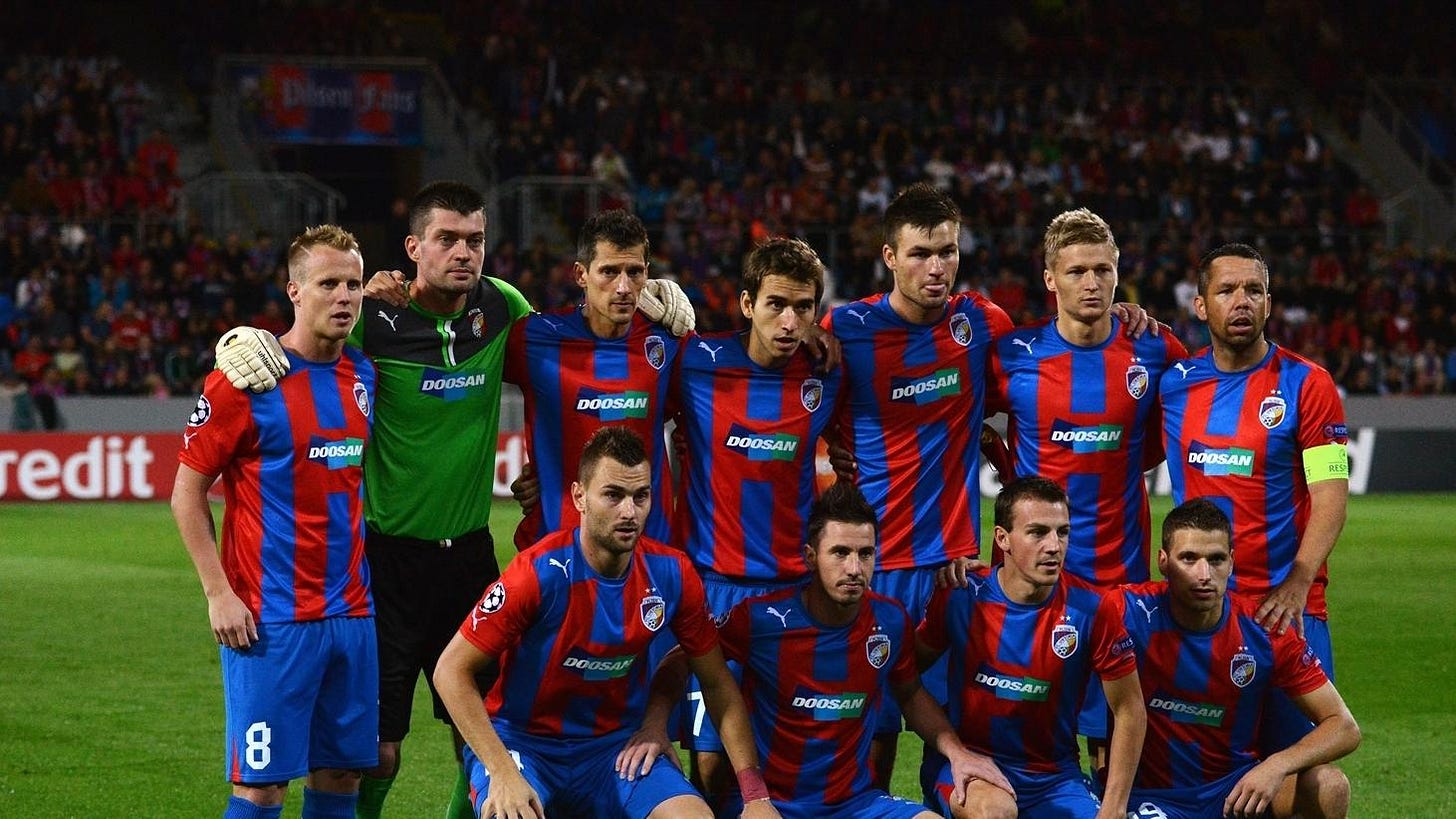
In an absolutely ideal world, the ‘Big 5’ leagues, in a normal year, could earn as much as 6.571 coefficient points through bonuses, and that is only considering the Champions League. Add the Europa League and Conference League, and the total goes up to 10.571 bonus points. Now, this assumes that the UCL semifinals features all four teams from the same country. Furthermore, with the UEL final would have to involve the two clubs from that country with both of them winning their groups. The UECL representative would have to do the same as their UEL compatriots.
In fact, just the 2.285 bonus points for the four clubs earning those automatic Champions League places, is more than many countries will manage to win via competitive performance this season. In fact, there are 18 countries that did not and will not reach that total this season.
Starting in the 2024-25 season, the two best countries in the most recent seasonal coefficient rankings will earn an extra Champions League spot. That means instead of seven European places for the ‘Big 5,’ that will become (at least) eight.
Looking at the current seasonal coefficients, this is the current top five:
Of those five countries, only Liechtenstein does not have bonus points. Now, here is the current seasonal coefficients without the bonus points.
These are points awarded via on-pitch performance in qualifying and the first half of the group stage:
Three of those five countries (Liechtenstein, Turkey and Norway) do not have a representative in the UCL group stage and thus no bonus points currently. Now, keep in mind that does include qualifying.
Here is one more table, looking at the coefficients won solely from group stage performances without bonus points:
This seldom comes as surprise since four of the five countries listed have not had a club eliminated from Europe this season (Belgium lost one team in qualifying).
As the group stages come to an end in a month’s time, it will be interesting to see how these numbers look. Pay close attention who finishes in the top two of their groups, as those points could be the difference maker in where certain countries finish in the rankings at season’s end.
David Parkes
Ömer’s Outro
Football Was, Is And Will Always Be Just A Game…
Ömer Çayir
This week’s edition of Revamp The Game also falls in the same week as World Mental Health Day. For me, this is a great opportunity to remind you all of the importance of your own well-being and the significant influence of mental health in our beloved game, football.
For many of us, football can act as an escape, or a relief from the stress of everyday life. Those sacred 90 minutes mean the absolute world to us all. The sense of social belonging and joy many gain from ‘a game’ is a feeling that will always remain unquantifiable. I also know I do not have to explain how it feels, because I know you, the reader, understand exactly what I mean.
However, let this come with a warning.
Having released myself from the notoriously toxic bubble of ‘Football Twitter’, I now glare at it from the outside with an extremely worrisome eye. Anger and hatred fuels the platform in a way that surely (to me) cannot be enjoyable. I often ask myself, if I were to be in the public eye as a professional footballer, how would I cope? How does one cope with the torrent of abuse delivered to their virtual doorstep week in week out?
As a Liverpool fan, my mind veers to the direction of Trent Alexander-Arnold. Now 24, arguably the standout right-back of this generation, a period of poor form has resulted in a barrage of hateful memes and disrespectful personal attacks that seem to have knocked every ounce of confidence from his game. However, I must assure you, I do not just reduce this ‘finger-pointing’ towards the fans. Mainstream media platforms often driven by the opinions of ex-professionals and so called ‘clicks’ are now completely desensitised to the issue of mental health amongst current footballers. In an era dominated by social media, it is quite frankly impossible for footballers of a previous generation to understand the non-stop flood of abuse that our players today receive. It is also naïve for us to think that all that is said and written is ignored by today’s professionals. Do you, say, as an 18-30 year old person ignore or listen to hateful comments directed your way? I’m sure I can speak for the large majority of us and say, it is in our very human nature to allow such comments to impact our own self-esteem, so why should we assume differently of professional footballers?
Don’t believe me? Well let me tell you about David Bentley.
‘This Ain’t For Me…’
Dubbed as the ‘Next David Beckham’ David Bentley retired from football aged 29. He cited many reasons as to why he came to this decision. Simply, in his own words, he had fallen out of love with football. Social media and the growing importance of statistics in football were key contributors to this outcome. For a man that had all the footballing ability in the world, he was often criticised for his lack of output and it is sad to see him conclude that retirement was the only option.
Below is a quote from a David Bentley interview highlighting these very feelings:
“The game has changed a lot – when I first started playing it was more about enjoying it, you went into work every day and it was brilliant.
“Now it’s a little bit robotic – with the social media side of it and the money that has come into the game – I hate to say it, but it’s made it boring, it’s made it predictable and a bit too calculated.
(Read the article here)
Whilst statistics do play a valuable part in today’s game, we should not obsess over them. We should not use them to jump to ‘be all and end all’ conclusions of a footballer and we should most definitely not weaponise statistics in order to send targeted abuse or trolling towards any footballer either.
I want you all to be reminded of Ronaldinho Gaucho. The Brazilian who brought joy and happiness to a generation of football fans.
He had this to say, ‘Football is about joy... I favour every idea that makes the game beautiful. Every good idea has to last.’
We, as a collective cannot allow tribalism and clickbait to transcend the very purpose of football. The purpose of footballers, as humans, to bring joy to us, the fans, as humans.
Football was, is and will always be…
just a game.
